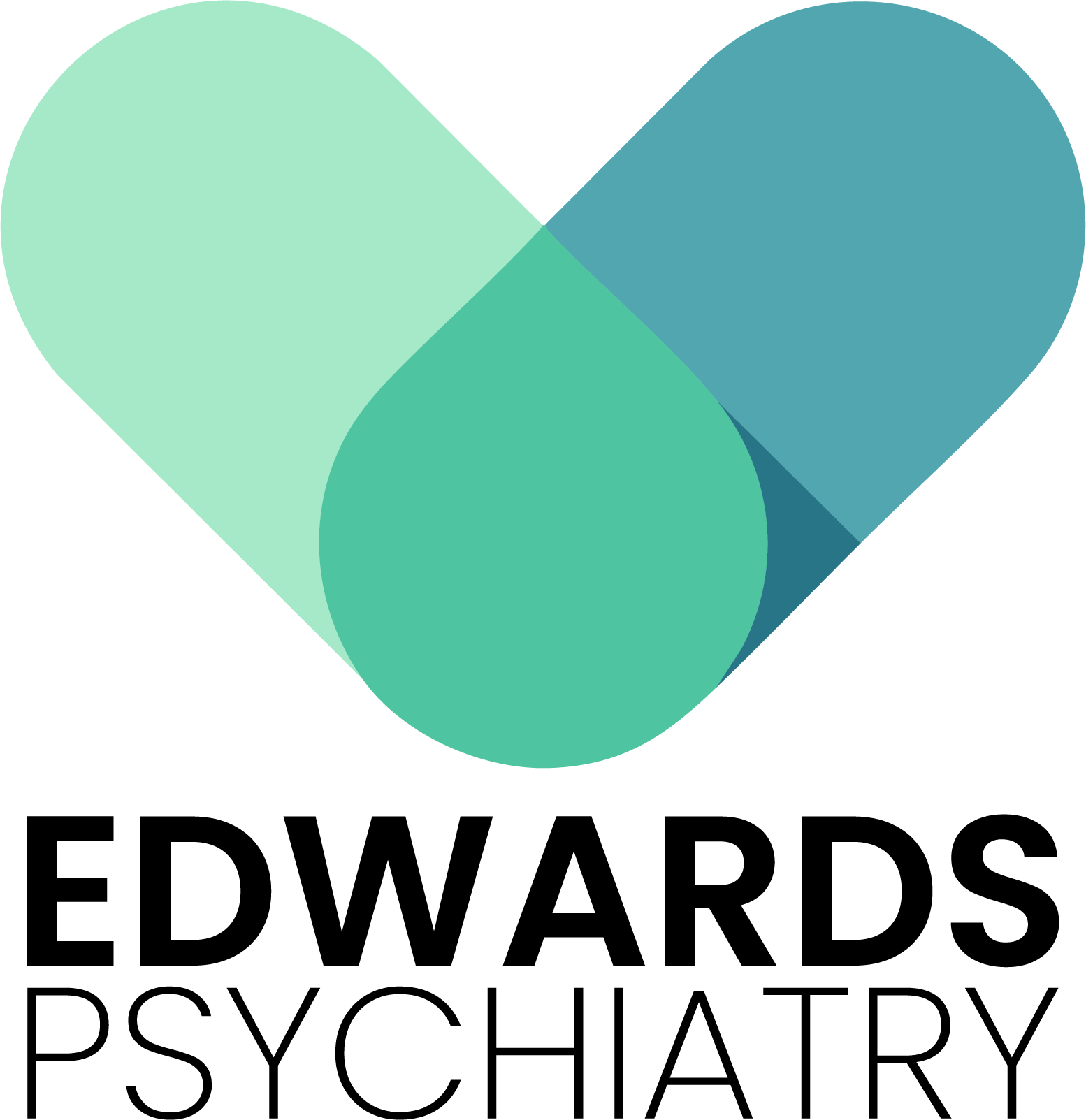The Truth About ADHD Medications: Debunking Myths and Exploring All Treatment Options | Seattle ADHD Psychiatry
A comprehensive guide to ADHD medication management and integrative psychiatry approaches in Seattle
When it comes to ADHD medication management, misinformation runs rampant. Many adults avoid seeking treatment because they've heard myths about stimulant medications being dangerous, addictive, or personality-changing. At
Edwards Psychiatry in Seattle, we believe that accurate information empowers better decisions about your mental health care.
The truth is that ADHD medication management involves much more than simply prescribing stimulants. As board-certified psychiatric nurse practitioners specializing in adult ADHD, we combine evidence-based medication management with integrative psychiatry approaches to create personalized treatment plans that work with your unique brain chemistry and lifestyle.
Whether you're considering medication for the first time, struggling with side effects from current treatment, or curious about alternatives to traditional stimulant medications, this comprehensive guide will help you understand all your options for effective ADHD treatment.
Article Roadmap
This guide covers the complete spectrum of ADHD medication management, from debunking common myths to exploring cutting-edge integrative approaches. You'll learn about different medication categories, understand how psychiatric care has evolved beyond one-size-fits-all prescribing, and discover how holistic care can enhance traditional treatment. We'll also address the unique considerations for adults seeking ADHD treatment in Seattle and throughout Washington state.
Understanding Modern ADHD Medication Management
ADHD medication management has evolved significantly from the days when psychiatrists had limited options and cookie-cutter approaches. Today's psychiatric care involves careful evaluation, personalized treatment planning, and ongoing monitoring to ensure optimal outcomes with minimal side effects.
At Edwards Psychiatry, our approach to medication management begins with comprehensive psychiatric evaluations that consider not just your ADHD symptoms, but your complete health picture. We examine how symptoms of ADHD affect your work, relationships, and daily functioning, while also considering any co-existing mental health conditions like anxiety and depression.
Modern psychiatry services recognize that people with ADHD often have unique metabolisms, genetic variations, and lifestyle factors that influence how they respond to different medications. This is why our psychiatric mental health approach emphasizes individualized care rather than standardized protocols.
The goal of effective medication management isn't just symptom reduction, it's helping you function at your best while maintaining your authentic personality and managing any side effects. This requires ongoing collaboration between patient and psychiatrist, with regular adjustments based on your experiences and changing life circumstances.
Debunking Common ADHD Medication Myths
One of the biggest barriers to effective ADHD treatment is the persistence of outdated myths about psychiatric medications. Let's address the most common misconceptions that prevent adults from seeking the care they need.
Myth: ADHD medications are dangerous and addictive.
The reality is that when prescribed and monitored by qualified psychiatric professionals, ADHD medications have an excellent safety profile. Stimulant medications, when used as prescribed for legitimate medical conditions, actually reduce the risk of substance abuse rather than increasing it. People with untreated ADHD are at higher risk for developing addiction issues.
Myth: ADHD medications change your personality.
Properly managed ADHD medication should help you feel more like yourself, not less. If medication makes you feel emotionally flat or unlike yourself, this usually indicates the need for dosage adjustment or trying a different medication. Our approach to mental health treatment prioritizes maintaining your authentic personality while reducing symptoms that interfere with your functioning.
Myth: You have to take stimulants to treat ADHD effectively.
While stimulant medications work well for many people, they're not the only option. Non-stimulant medications, integrative approaches, and combination treatments can be equally effective, especially when tailored to individual needs and circumstances.
Myth: Once you start ADHD medication, you'll need it forever.
Treatment duration varies greatly among individuals. Some people benefit from long-term medication management, while others find that therapy, lifestyle changes, or short-term medication use provides lasting improvement. The decision about treatment duration should always be collaborative and based on your individual response and life goals.
Stimulant Medications: Benefits and Considerations
Stimulant medications remain the first-line treatment for ADHD because they're effective for approximately 70-80% of people with the condition. These medications work by increasing levels of dopamine and norepinephrine in the brain, improving focus, reducing impulsivity, and helping with executive functioning.
The two main categories of stimulant medications are methylphenidate-based (like Ritalin and Concerta) and amphetamine-based (like Adderall and Vyvanse). Each category works slightly differently, and some people respond better to one type than the other. This is why personalized medication management often involves trying different options to find the best fit.
Modern stimulant medications come in various formulations, from short-acting options that last 4-6 hours to extended-release versions that provide all-day coverage. Your lifestyle, work schedule, and personal preferences all factor into determining which formulation works best for your needs.
Common side effects of stimulant medications include decreased appetite, sleep difficulties, and slight increases in heart rate or blood pressure. Most side effects are mild and manageable, often improving as your body adjusts to the medication. When side effects are problematic, adjusting the dose, timing, or switching to a different medication often resolves the issues.
At Edwards Psychiatry, we carefully monitor all patients taking stimulant medications, checking in regularly about effectiveness and side effects. We also provide practical strategies for managing common side effects, such as timing meals appropriately and establishing good sleep hygiene.
Non-Stimulant ADHD Medications: Effective Alternatives
Non-stimulant medications offer important alternatives for people who don't respond well to stimulants or experience intolerable side effects. These medications can be equally effective and may be preferable for certain individuals or circumstances.
Atomoxetine (Strattera) is a selective norepinephrine reuptake inhibitor that works differently from stimulants. It takes longer to reach full effectiveness, usually 4-6 weeks, but provides 24-hour symptom coverage and doesn't have the potential for abuse. Strattera can be particularly helpful for adults who also experience anxiety, as it often has calming effects.
Viloxazine (Qelbree) is the newest FDA-approved non-stimulant for ADHD. It's a serotonin norepinephrine modulating agent that can improve attention and reduce hyperactivity. Like Strattera, it takes time to build up in your system but provides consistent, all-day coverage.
Alpha-2 agonists like guanfacine (Intuniv) and clonidine (Kapvay) were originally blood pressure medications that also improve ADHD symptoms. They're particularly helpful for people who experience emotional dysregulation, aggression, or sleep difficulties alongside their ADHD symptoms.
Non-stimulant medications may be preferred for adults with a history of substance abuse, certain heart conditions, or those who experience significant sleep or appetite issues with stimulants. They can also be used in combination with stimulants to address symptoms that stimulants alone don't fully manage.
The key advantage of non-stimulant medications is their smooth, consistent effect throughout the day without the ups and downs that some people experience with stimulants. They also don't require special prescribing restrictions and can be easier to manage for people with busy travel schedules.
Integrative Psychiatry Approaches to ADHD
At Edwards Psychiatry, we believe that effective ADHD treatment often extends beyond medication alone. Our integrative psychiatry approach combines evidence-based medical treatment with complementary strategies that support overall brain health and well-being.
Nutritional support plays a crucial role in ADHD management. Research shows that certain nutrients can enhance the effectiveness of traditional treatments. Omega-3 fatty acids, particularly EPA and DHA, support brain function and may reduce ADHD symptoms. Magnesium helps with sleep and emotional regulation, while zinc supports dopamine function and may enhance the effectiveness of stimulant medications.
Mind-body approaches like mindfulness meditation, yoga, and breathing exercises can significantly improve attention regulation and emotional control. These practices help develop the prefrontal cortex, the brain region responsible for executive functioning, and provide valuable skills for managing stress and impulsivity.
Exercise and movement have profound effects on ADHD symptoms. Regular physical activity increases dopamine and norepinephrine levels naturally, improves mood, and enhances cognitive function. We often recommend specific exercise protocols as part of comprehensive treatment plans.
Sleep optimization is critical for ADHD management. Poor sleep exacerbates ADHD symptoms, while good sleep hygiene can dramatically improve focus and emotional regulation. We address sleep issues through both behavioral interventions and, when necessary, appropriate medications like melatonin.
Our integrative approach doesn't replace traditional psychiatric care, it enhances it. By addressing multiple factors that influence brain function, we can often achieve better outcomes with lower medication doses or provide additional symptom relief for people who don't fully respond to medication alone.
Personalized Treatment Planning: Beyond One-Size-Fits-All
Effective ADHD medication management requires recognizing that every person's brain is unique. Factors like genetics, metabolism, lifestyle, co-existing conditions, and personal preferences all influence treatment decisions. This is why our psychiatric practice emphasizes personalized care planning from the very beginning.
During your initial psychiatric evaluation, we gather comprehensive information about your symptoms, medical history, family history, lifestyle factors, and treatment goals. We also consider practical factors like work schedules, family responsibilities, and financial considerations when developing your treatment plan.
Genetic testing can provide valuable insights into how you're likely to metabolize different medications, helping us make more informed initial choices and avoid trial-and-error approaches. While not necessary for everyone, genetic testing can be particularly helpful for people with complex medical histories or those who've had poor responses to previous treatments.
We also recognize that treatment needs change over time. Life transitions, stress levels, hormonal changes, and evolving responsibilities all influence how ADHD symptoms manifest and how treatments work. Regular follow-up appointments allow us to adjust your treatment plan as needed, ensuring continued effectiveness.
Our collaborative approach means you're always an active participant in treatment decisions. We provide education about different options, discuss potential benefits and risks, and work together to find approaches that align with your values and lifestyle.
Addressing Co-Existing Mental Health Conditions
Many adults with ADHD also experience other mental health conditions like anxiety, depression, or mood disorders. Effective treatment requires addressing all aspects of your mental health, not just ADHD symptoms in isolation.
Anxiety and ADHD frequently co-occur, and the relationship between them can be complex. Sometimes anxiety is a secondary result of untreated ADHD—the constant struggle to focus and manage daily tasks creates chronic stress. Other times, anxiety is a separate condition that requires its own treatment approach.
Depression can also develop as a result of years of ADHD-related struggles, or it may be an independent condition. The overlap in symptoms between ADHD and depression can make diagnosis challenging, which is why comprehensive evaluation is so important.
When treating co-existing conditions, medication choices become more nuanced. Some ADHD medications can worsen anxiety, while others may have calming effects. Non-stimulant medications are often preferred when anxiety is prominent, and some antidepressants can actually help with both conditions.
Our approach involves treating the whole person, not just individual diagnoses. This might mean using combination therapy, integrating psychotherapy with medication management, or employing holistic approaches that support overall mental health.
The Role of Therapy and Coaching in ADHD Treatment
While medication can significantly improve ADHD symptoms, therapy and coaching provide essential skills for long-term success. Cognitive-behavioral therapy (CBT) specifically adapted for ADHD helps people develop practical strategies for organization, time management, and emotional regulation.
ADHD coaching focuses on building executive functioning skills and creating systems that work with, rather than against, your ADHD brain. Coaches help with practical issues like developing organizational systems, breaking large projects into manageable steps, and creating accountability structures.
Therapy for ADHD can address emotional aspects of the condition, including low self-esteem from years of struggles, relationship difficulties, and the process of adjusting to diagnosis and treatment. Many adults benefit from processing their experiences and developing a more positive relationship with their ADHD.
The combination of medication and therapy often produces better outcomes than either approach alone. Medication can create the neurochemical foundation for improved functioning, while therapy and coaching provide the tools and strategies to maximize that improvement.
At Edwards Psychiatry, we coordinate with therapists and coaches to ensure all aspects of your care work together cohesively. This collaborative approach maximizes the benefits of each intervention and supports comprehensive improvement.
Monitoring and Adjusting Treatment Over Time
Effective ADHD medication management is an ongoing process, not a one-time prescription. Regular monitoring ensures that your treatment continues to meet your needs while minimizing any side effects or complications.
During follow-up appointments, we assess medication effectiveness, monitor for side effects, and discuss any changes in your life circumstances that might affect treatment. We also review your overall functioning in different areas, work, relationships, self-care, to ensure treatment is supporting your broader life goals.
Dosage adjustments are common and normal part of ADHD treatment. Your optimal dose may change based on stress levels, life transitions, weight changes, or the addition of other medications. Some people need seasonal adjustments, while others require modifications during particularly demanding periods.
Medication holidays or "drug holidays" may be appropriate for some people, particularly during less demanding periods or to reassess baseline functioning. These breaks should always be planned and supervised by your psychiatric provider.
Long-term monitoring includes periodic assessment of physical health markers like blood pressure, heart rate, and growth (in younger patients). We also stay current with new research and treatment options that might benefit your care.
The goal is always to maintain optimal functioning with the least intrusive treatment necessary. Some people find they can reduce medication doses over time as they develop better coping skills, while others benefit from consistent long-term treatment.
Lifestyle Factors That Enhance Treatment Effectiveness
ADHD medication works best when combined with lifestyle choices that support brain health and overall well-being. These factors can enhance medication effectiveness and provide additional symptom relief.
Nutrition plays a crucial role in ADHD management. A balanced diet with adequate protein, complex carbohydrates, and healthy fats provides steady energy for optimal brain function. Some people find that avoiding artificial colors, preservatives, and excessive sugar helps with symptom management.
Regular exercise has profound effects on ADHD symptoms. Aerobic exercise increases dopamine and norepinephrine levels naturally, improves mood, and enhances cognitive function. Even moderate exercise like daily walks can provide meaningful benefits.
Sleep hygiene is critical for people with ADHD. Poor sleep exacerbates symptoms and can reduce medication effectiveness. Establishing consistent sleep schedules, creating restful environments, and addressing sleep disorders when present significantly improves overall functioning.
Stress management techniques help prevent symptom flare-ups and improve treatment outcomes. This might include mindfulness practices, relaxation techniques, or regular activities that bring joy and reduce stress.
Social support enhances treatment effectiveness by providing understanding, encouragement, and practical assistance. This might involve family education, support groups, or connecting with others who understand the ADHD experience.
Working with Edwards Psychiatry: A Collaborative Approach
At Edwards Psychiatry, we understand that seeking ADHD treatment as an adult requires courage and often involves overcoming years of self-doubt and misinformation. Our approach is designed to be welcoming, respectful, and culturally responsive to the diverse Seattle community we serve.
Our team includes board-certified psychiatric nurse practitioners with specialized training in ADHD and integrative psychiatry approaches. We're committed to staying current with the latest research and treatment developments, ensuring our patients receive the most effective care available.
Our evaluation process is comprehensive and unhurried. We take time to understand your unique experiences, symptoms, and goals. This includes reviewing your history, discussing current challenges, and exploring how ADHD symptoms affect different areas of your life.
Treatment planning is always collaborative. We explain different options, discuss potential benefits and risks, and work together to develop an approach that aligns with your preferences and lifestyle. We never pressure anyone into treatments they're uncomfortable with.
Ongoing support includes regular follow-ups, 24/7 communication through our patient portal, and coordination with other members of your care team when appropriate. We're committed to being responsive to your needs and adjusting treatment as circumstances change.
As a private-pay practice, we're able to spend adequate time with each patient and avoid the time constraints often imposed by insurance companies. We provide superbills for potential insurance reimbursement and accept HSA/FSA benefits.
Frequently Asked Questions About ADHD Medication Management
How long does it take for ADHD medication to work?
Stimulant medications typically begin working within 30-60 minutes and reach peak effectiveness within 1-2 hours. Non-stimulant medications take longer, often 4-6 weeks to reach full effectiveness. However, finding the optimal medication and dose can take several months.
What if the first medication doesn't work?
It's common to try several medications before finding the best fit. About 20-30% of people don't respond to the first medication tried, but most eventually find effective treatment. This is why working with experienced psychiatric providers is so important.
Can you drink alcohol while taking ADHD medication?
Alcohol can interfere with ADHD medication effectiveness and increase side effects. We discuss alcohol use during treatment planning and provide guidance based on your specific medication and circumstances.
Do ADHD medications cause weight loss?
Some people experience decreased appetite and weight loss, particularly with stimulant medications. We monitor this closely and provide strategies for maintaining healthy nutrition. For most people, appetite effects diminish over time.
What about pregnancy and ADHD medication?
Pregnancy requires careful consideration of risks and benefits. Some ADHD medications are safer during pregnancy than others, and some women choose to discontinue medication during pregnancy. This decision should always be made in consultation with both psychiatric and obstetric providers.
How do you know if medication is working?
Improvement typically includes better focus, reduced impulsivity, improved organization, and enhanced ability to complete tasks. Family members and colleagues often notice improvements before the person taking medication does. We use standardized rating scales to track progress objectively.
What about side effects?
Most side effects are mild and temporary. Common ones include decreased appetite, sleep difficulties, and slight increases in heart rate. We provide strategies for managing side effects and adjust treatment when necessary to minimize discomfort.
Taking the Next Step: Starting Your ADHD Treatment Journey
If you're considering ADHD medication management or want to explore integrative approaches to treatment, Edwards Psychiatry is here to support your journey. Many adults find that proper diagnosis and treatment transforms their lives, helping them achieve goals they never thought possible.
The first step is scheduling a free 15-minute consultation with Dr. Domenique Edwards. This brief conversation allows us to understand your concerns, answer initial questions, and determine if comprehensive evaluation would be beneficial for you.
During this consultation, we can discuss your symptoms, previous experiences with mental health treatment, and goals for care. We'll also explain our approach and what you can expect during the evaluation process.
What to expect during evaluation:
Our comprehensive psychiatric evaluation typically takes 90 minutes and covers your current symptoms, childhood and family history, medical history, and how ADHD symptoms affect your daily life. We create a comfortable, non-judgmental environment where you can share your experiences openly.
Getting started with treatment:
If evaluation confirms ADHD diagnosis, we'll work together to develop a personalized treatment plan. This might include medication, integrative approaches, therapy referrals, or combination treatments based on your needs and preferences.
Ongoing partnership:
ADHD treatment is most successful when it's a collaborative partnership between patient and provider. We're committed to supporting you throughout your treatment journey, adjusting approaches as needed, and celebrating your progress along the way.
Many adults describe ADHD diagnosis and treatment as life-changing, finally understanding why certain things have always been challenging and discovering that effective help is available. Whether you're seeking clarity about persistent struggles or looking for better treatment options, we're here to provide expert, compassionate care.
Your brain is unique, and your treatment should be too. At Edwards Psychiatry, we're honored to help you discover approaches that work with your individual neurobiology and support your personal goals for health and well-being.
Take the first step toward understanding and supporting your brain by scheduling your free consultation today. You deserve care that honors your experiences and provides hope for your future.
Share This Post
About the Author:
Domenique Edwards, MSN, ARNP, PMHNP-BC
Domenique is the founder of Edwards Psychiatry and a Board-Certified Psychiatric-Mental Nurse Practitioner specializing in ADHD care for adults and families. As a multiracial Black and Italian clinician, she brings both clinical expertise and lived understanding to mental health care, particularly for BIPOC and LGBTQIA+ communities.
Trained at a top university, Vanderbilt University School of Nursing, Domenique has been practicing independently in Seattle since 2017. She's passionate about providing the kind of collaborative, culturally competent psychiatric care she wished her own family had access to, where patients feel truly heard and understood.
You Might Also Like






